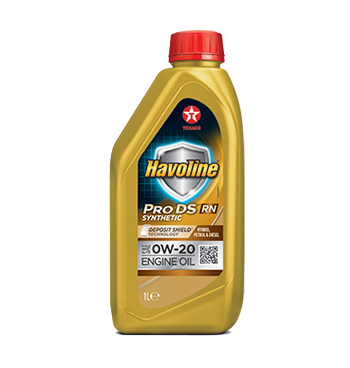
Havoline ProDS RN SAE 0W-20
Premium performance synthetic engine oil

Havoline ProDS RN SAE 0W-20 is a premium performance synthetic engine oil, formulated with advanced technology additives and designed to meet latest Renault low emissions and fuel efficiency requirements.
- Havoline ProDS RN SAE 0W-20 is suitable for use in direct & indirect injection gasoline cars equipped with a GPF, Euro 6 diesel cars equipped with a DPF, and engines manufactured after mid-2018 and hybrid cars that require RN17FE approved engine oils. It is a mid SAPS fuel economy oil compatible with latest after- treatment systems including gasoline and diesel particulate filters (GPF/DPF).
- Havoline ProDS RN SAE 0W-20 is not suitable for vehicles requiring an VW 508.00/509.00 approved engine oil. For cars requiring these specifications we recommend our Havoline ProDS VB SAE 0W-20.
- Havoline ProDS RN SAE 0W-20 is not suitable for vehicles requiring an BMW LL-17FE+ or MB 229.71 approved engine oil. For cars requiring these specifications we recommend our Havoline ProDS MG SAE 0W-20.
- Formulated to meet latest Renault RN17FE low exhaust emission and fuel-efficiency requirements in both gasoline and diesel engines
- Developed with high performance SAE 0W-20 viscosity and an advanced additive system, helping reduce vehicle fuel consumption
- Mid SAPS technology promotes catalyst, gasoline and diesel particulate filter system protection, helping minimise exhaust emissions
- Offers reliable oxidation stability and keep-clean performance, helping keep components such as turbochargers free of harmful deposits
- Designed for robust wear and corrosion protection in cylinders, pistons, rings, and valve train components, helping optimise service life
- Low temperature fluidity aids rapid lubricant circulation during cold engine starts, contributing to increased engine wear protection
Always confirm that the product selected is consistent with the original equipment manufacturer’s recommendation for the equipment operating conditions and customer’s maintenance practices
































